- Home
- John Boyne
Next of Kin Page 6
Next of Kin Read online
Page 6
Looking below he saw that fool Raymond Davis stepping back inside the house and frowned. He thought everyone had left by now and he particularly despised Raymond. A mutual friend had told him how Stella and he had taken a suite at the Savoy two weeks before and stayed there together overnight, something she had never told him herself, and he felt a stab of pain and jealousy at the thought of it. If Raymond was any kind of a man it wouldn’t be so bad, he thought, but he was a simpleton. A lover of flowers. Beneath Owen and unworthy of Stella. Undeserving of her intimacies. Exactly the kind of emasculated fool that Montignac could hardly look at without feeling a violent contempt. Why was he still here anyway? Couldn’t he just leave like everyone else?
He stepped back from the windows and his eyes moved to the bed, where Peter Montignac had been on the last occasion that his nephew had seen him.
He looked at the pillows that had surrounded his weakened uncle on the bed and felt a slight twitch of unhappiness as he blocked the memory of that afternoon from his mind. Something he had eaten earlier made his stomach feel uncertain and he stepped quickly from the room, closing the doors behind him, and resolved not to enter again until the estate had been settled and was finally his.
With the death of his uncle there was no doubt in Owen Montignac’s mind that he was about to become a very wealthy man; the one thing he could not afford, however, or so he told himself, was a conscience.
10
HENRY DOMSON ENTERED THE dock with a look of remorse and humility on his face; however, had his expression mirrored how he felt inside there would have been a wide smirk plastered across his youthful features.
It had been almost six months since the evening when he, along with three friends, had broken into the Schulberg Jewel Warehouse beside London Bridge and almost nine since he had first drawn up the plans for the heist. It had all seemed remarkably simple to begin with. Through some of his more dubious underworld connections he had managed to get a schematic of the warehouse itself along with a timetable of the different guards who were on duty each night. They had simply forced the lock and overpowered two of the guards before filling their bags with millions of pounds’ worth of jewellery and beginning their escape.
Everything had gone according to plan until they turned to leave the warehouse when they were surprised to see a group of policemen enter, shouting at them to drop the bags. When a chase ensued and he had found himself cornered by two of them, he had felt no hesitation in shooting the first and only regretted that his gun had stalled or he would almost certainly have made a clean escape.
When he first met his barrister, Mr Justice McAlpine, and the instructing solicitor they had looked at him contemptuously and informed him that this was something of an open-and-shut case and the best he could hope for was to admit the offence, throw himself on the mercy of the judge and pray for a custodial sentence. More and more murderers, they told him, were seeing their death sentences commuted to life imprisonment if they appealed for clemency but the murder of a police officer, well that was different. There was really very little hope.
‘It’s encouraging to see that you throw in the towel so easily,’ Domson said to McAlpine with a sarcastic laugh. ‘Do you have much of a record of winning your cases or are you generally too frightened to fight them?’
‘I can fight a case if there are merits on which to fight it,’ said McAlpine in a gravelly tone, for he was far too old and experienced to allow himself to be spoken down to by a young man who had thought nothing of taking a life in cold blood. ‘But it’s very difficult in a case like this to make out grounds for leniency.’
‘Perhaps I should tell you a little bit about my background then,’ said Domson with a smile. ‘Maybe I can help you out.’
And so the business of Domson’s birth and genealogy was brought to the surface. At first neither Mr Justice McAlpine nor his solicitor believed what Domson was saying—that his great-great-grandmother had been the youngest child of a middle daughter of King George IV. They made a few notes on a piece of paper and tried to calculate what the relationship would be.
‘What does that mean then?’ asked McAlpine. ‘That would make you a first cousin once removed to the king, would it?’
‘A second cousin, actually,’ said Domson, referring to George V, who was enjoying the dying months of his reign. ‘Queen Victoria was my great-grandmother.’
‘Then you would claim a position within the succession,’ asked McAlpine dubiously.
‘Very distantly,’ said Domson. ‘I believe I’m number twenty-seven at the moment. Although some years ago I reached as high as eighteen. Until they started breeding,’ he added with disdain.
McAlpine smiled and nodded his head; he was accustomed to prisoners making up the most outrageous stories in order to help their case but he generally offered them very little credence. This, however, was the most audacious suggestion he had heard in a long time.
‘Well I’ll have to investigate this,’ he said. ‘I’ll be back in to see you tomorrow morning and we’ll talk again then.’
Later that day McAlpine set one of his pupils the task of investigating the ancestry of young Mr Domson and, to his surprise, he was informed that everything he had been told was in fact true.
‘This puts the case into an entirely new light,’ he told his client the following morning. ‘I think it’s safe to say that we will be able to avoid the death penalty.’
‘I thought as much,’ said Domson dismissively.
‘But it will be important for you to show remorse and ask for mercy,’ said the barrister. ‘You do understand that, don’t you?’
‘I’m not pleading guilty,’ he replied.
‘I’m sorry?’
‘I said I’m not pleading guilty,’ said Domson with as nonchalant an air as if he was simply deciding between the soup or the melon starter. ‘If I plead guilty I’ll automatically be sentenced. They won’t hear my case.’
‘Well … yes,’ said McAlpine.
‘Then I want to plead not guilty,’ explained Domson.
‘If you do that, young man, the chances of the judge showing you any mercy in the event of your conviction diminish tenfold.’
‘In the event of my conviction perhaps,’ said Domson. ‘But that won’t happen. I am an old Etonian, Mr McAlpine. I am twenty-seventh in line to the throne of England and a second cousin to the king. Do you really think that a dozen fishmongers and schoolteachers and cobblers are going to take it on to their own consciences to send me to the gallows? There’s enough of a mystique about my extended family among the plebs and the riff-raff to ensure that I’ll be let off. Just give them enough reasons to be unsure about the safety of a conviction and I guarantee they’ll jump at the chance.’
‘I’m not so sure about that,’ said McAlpine, who had been practising at the Bar for almost thirty years and had never come across a client so convinced of his own ability to persuade the jurors while yet being so obviously guilty.
‘Trust me,’ said Domson. ‘In any event, those are my instructions.’
And so Henry Domson had pleaded not guilty to the capital crime and over the course of the previous six months the evidence had mounted up against him. George V had died, to be replaced by Edward VIII, and suddenly he was twenty-sixth in line to the throne, albeit reverting from a second cousin of the monarch to a third. Throughout it all, as McAlpine tried to convince him to change his plea mid-trial, he had refused, continuing to maintain that his social standing would, at the end of the day, save his neck.
Then, on the Thursday of the previous week, the foreman of the jury had stood up in the dock and announced that after only twenty-three minutes of deliberations they had voted, twelve to zero, to find Henry Domson guilty as accused.
‘And that wiped the smile off the bugger’s face,’ McAlpine told his wife when he returned home that evening.
He had spoken to his client only once in the time between the reading of the verdict and this morning, when the sentence was to be pa
ssed, and his self-confidence had certainly taken a beating in the intervening days; however, his arrogance was still such that he refused to believe that the judge would give him anything other than the most lenient of sentences.
‘He seems like a decent old fellow,’ said Domson, who had observed him throughout the trial, noting the expression on his face when the more unsavoury aspects of the night in question were brought up in court. ‘Where did he go to school anyway?’
‘Where he went to school is of no more concern to this case than how he likes his eggs cooked in the morning,’ said Mr Justice McAlpine abruptly. ‘Really, Henry, at some point you are going to have to start taking these proceedings seriously. Your life is at stake here.’
But Domson didn’t care. No judge at a British court, he insisted, would ever sentence a man of his standing to such an extreme punishment. He would be given a few years at an easy prison and, following an appeal, would be quietly released after six months and allowed to return to his former life with a slap on the wrist and a promise to go forth and sin no more.
‘I have every faith in the victory of British snobbery over British justice,’ he said as he adjusted his tie in the mirror.
However, as he was not entirely stupid, he tried to appear remorseful as he stood in the dock while Mr Justice Roderick Bentley KC entered the courtroom and took his seat on the bench, rearranging a few books and papers around him and pouring a tall glass of water as he waited for the assembled throng to settle down. The judge looked around and felt slightly irritated by how many people were there, as if the decision regarding a man’s life and death was nothing more than a spectator sport. Throwing his eyes up to the gallery he saw his wife, Jane, sitting beside their old friend, Eleanor Tandy, and she inclined her head a little to him when their eyes met. He was glad that after today there would be no more conversations between them regarding what he should do for the best in this case, what he should do for their best. Because justice, he had decided within minutes of the verdict coming through the previous Thursday, had to be blind to all matters, including those of class and social standing.
Under instruction from the bailiff, Henry Domson stood up and the entire courtroom went silent, collectively holding their breath as Roderick cleared his throat and began to speak.
* * *
‘HENRY DOMSON,’ HE BEGAN. ‘You have been found guilty of the murder of Police Constable Peter Milburn who, at the time of the offence, was acting in accordance with his duties. Murder, of course, is a capital crime and the murder of a police officer is a particularly heinous one.’
He continued for some minutes in this vein, citing precedent and incident which he had considered during his deliberations and Domson tried not to yawn in boredom while the spectators tried not to shout Hurry up!
‘The court is aware,’ said Roderick finally, ‘of Mr Domson’s previous good character, his educational achievements at Eton.’ He said the school’s name with a contemptuous sigh as he himself was an old Harrovian. ‘And his relationship, albeit distant, with certain celebrated figures in the hierarchy of our country. However, the scales of justice are weighted by one who is oblivious to matters such as these, by one who is blind to both circumstance and title. They are merely side notes by which one can feel shock and disappointment that a fellow with so much to offer the world chose to turn his back on it.’
He opened his mouth to pass the final sentence and as he did so a vision of his son, Gareth, who at twenty-three was the same age as Henry Domson, came into his head. What if things were different, he thought? What if it was Gareth standing in the dock while another silk made such a decision? What would he think of this then? It was obvious, he decided. He would take his punishment like a man. The law was the law and had to be upheld; these were the foundations upon which he had built his life and nothing could make him turn his back on them. He blinked and dismissed the image from his head; he had a job to finish.
‘And so I direct that you, Henry Domson, be taken from this place to await execution for the murder of Peter Milburn. I sentence you to be hanged from the neck until dead and may God have mercy on your soul.’
The court let out a collective gasp, Domson looked dumbstruck for the first time since the police had charged through the warehouse doors, and Lady Jane Bentley—her mind on invitations to garden parties at the palace and the outfit that she would wear to the coronation—sat in the front row of the upstairs gallery, closed her eyes slowly and shook her head with a sigh. Oh Roderick, she thought with as much sorrow as anger. What have you done?
TWO
1
WHILE LESS CONFIDENT OR successful men may have developed a chip on their shoulder regarding their lack of stature, Nicholas Delfy, the owner of the Unicorn Ballrooms, never allowed such a trivial and superficial matter to be of any concern to him. Standing at no more than five feet and four inches in height, Delfy had a small frame and glided around his club with the elegance and grace of a ballet dancer. A stickler for grooming and personal appearance, he had his thick, dark hair trimmed by his personal barber first thing every Monday morning while a manicurist simultaneously attended to his nails. He wore dark Savile Row suits with black shirts and ties and, with his youthful and clean-shaven complexion, he more closely resembled a teenaged boy smartly dressed for a funeral than a thirty-eight-year-old man who controlled an underground business empire around London, catering for the needs of those who were unable to find satisfaction elsewhere.
There was a quick two-rap knock on the door and he looked up to see Jimmy Henderson, also dark-suited and dark-tied but considerably taller and bulkier of build than his employer, stepping inside. Henderson was in his early forties and had the bald-headed, bull-nosed look of a former boxer who had come off the worst in most of his bouts.
‘Boss,’ said Henderson, hovering awkwardly in front of him for a moment until Delfy nodded towards the chair on the other side of the desk and he lowered himself into it gingerly; it was not a chair designed for a man of his build.
‘Is it busy out there?’ asked Delfy.
‘It’s getting going,’ said Henderson, glancing up at the clock as he did so. ‘It’s only nine o’clock. It’ll pick up.’
‘Anyone in?’
‘No one special.’
Delfy nodded. He only asked out of form. The Unicorn Ballrooms—not a ballroom at all, of course, but the elaborate title pushed the gambling tables closer to respectability—was one of the busiest and most profitable concerns of its type operating in London and Delfy one of its most successful entrepreneurs. Stretched around five thousand square feet of underground rooms and passages beneath a laundry, a homeopathy store and a tobacconist’s, it made its money from gambling and drinking, and those who visited found themselves lost in such an atmosphere of luxury and hedonism that they never wanted to leave. There was no natural lighting but the furnishings were of a high standard and formal dress was mandatory. As an employer, Delfy was well known for valuing his loyal staff highly—his wage bill was almost fifteen per cent higher than that of his nearest rivals—and they responded by making sure that every client was pampered and groomed and, most importantly, came back for another visit. He knew that it was money well spent.
He tapped his fingers on the desk nervously, needing to ask but not wanting to appear weak in front of his henchman. There was no way around it but he looked at his papers while asking the question so as to appear disinterested in the answer, hating the fact that he couldn’t hide his vulnerability.
‘Well?’ he asked eventually. ‘How did it go? Is everything sorted?’
‘It went fine,’ said Henderson with a shrug. ‘You can put her out of your mind now.’
Delfy nodded; a girl called Alice who had worked for him, a girl he had come close to liking, had been discovered stealing from the club and he hadn’t been left with any choice.
‘I don’t…’ began Delfy, trying to find the correct words but stumbling over them. ‘I don’t want her mentioned around her
e again, is that understood?’
‘Sure, boss.’
‘Let the others know, all right?’
‘Will do.’
‘And keep those new ones away from me too,’ he added irritably, referring to the half-dozen girls who had recently been recruited to the Unicorn and who were coming to the end of their first week of employment there. ‘They come down here asking whether I want a drink or a cigarette all the time and it’s starting to annoy me. I’m their employer, not their friend, all right?’
‘I know, boss. I’ll tell them.’
‘I don’t want to make this corridor out of bounds but if I have to…’
‘Don’t worry about it, boss. I’ll take care of it.’
‘It just makes me … bloody angry,’ he continued, his voice rising despite the fact that Henderson was agreeing with him. ‘You need to keep them in line, you understand me?’
‘I understand, boss. I’ll see to it,’ he replied, keeping his voice quiet and steady, the only way he knew to control his employer when he began a tirade like this.
‘Well start seeing to it then,’ said Delfy, practically shouting now. ‘Because if another one of them turns up at my door claiming they’ve gone down the wrong corridor again they’ll be sorry they did it.’
‘Yes, boss.’
‘I’m trying to run a business here.’
‘I understand, boss.’
‘I shouldn’t even have to tell you.’
Henderson nodded; he could see that his employer was getting that twitchy, irritated air about him that always hit when a situation arose that he didn’t feel in control of.

 Beneath the Earth
Beneath the Earth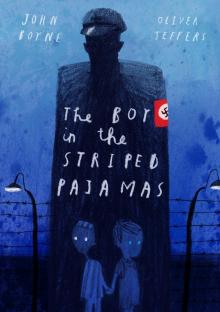 The Boy in the Striped Pajamas
The Boy in the Striped Pajamas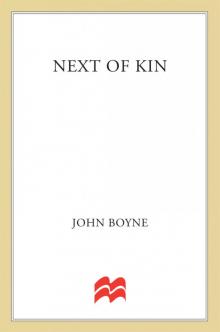 Next of Kin
Next of Kin The House of Special Purpose
The House of Special Purpose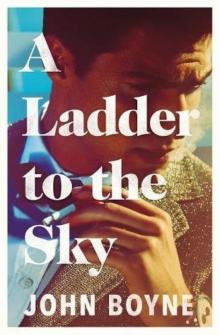 A Ladder to the Sky
A Ladder to the Sky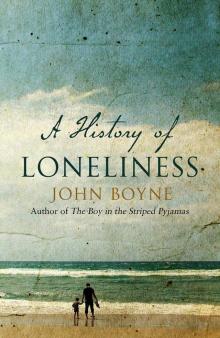 A History of Loneliness
A History of Loneliness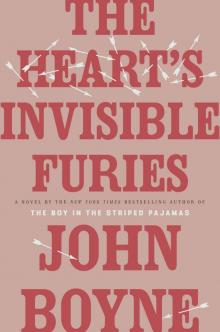 The Heart's Invisible Furies
The Heart's Invisible Furies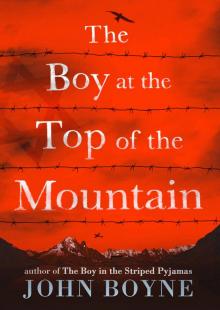 The Boy at the Top of the Mountain
The Boy at the Top of the Mountain Stay Where You Are and Then Leave
Stay Where You Are and Then Leave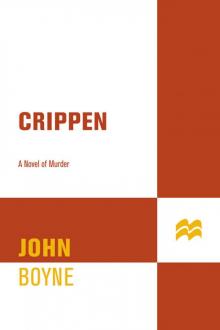 Crippen: A Novel of Murder
Crippen: A Novel of Murder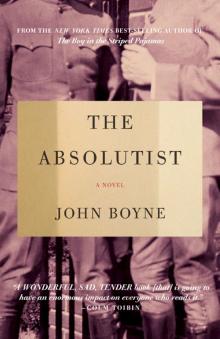 The Absolutist
The Absolutist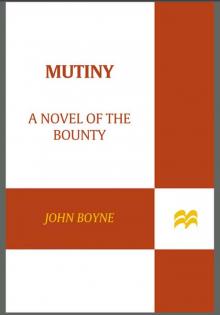 Mutiny: A Novel of the Bounty
Mutiny: A Novel of the Bounty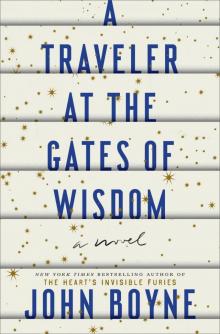 A Traveler at the Gates of Wisdom
A Traveler at the Gates of Wisdom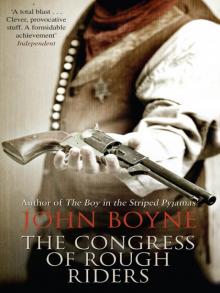 The Congress of Rough Riders
The Congress of Rough Riders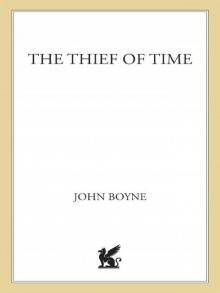 The Thief of Time
The Thief of Time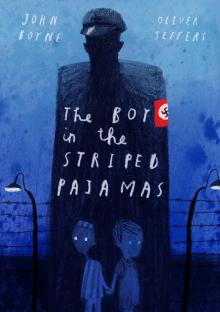 The Boy in the Striped Pajamas (Deluxe Illustrated Edition)
The Boy in the Striped Pajamas (Deluxe Illustrated Edition)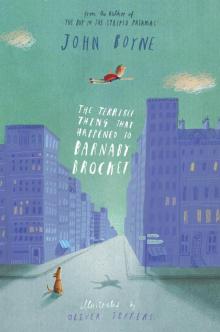 The Terrible Thing That Happened to Barnaby Brocket
The Terrible Thing That Happened to Barnaby Brocket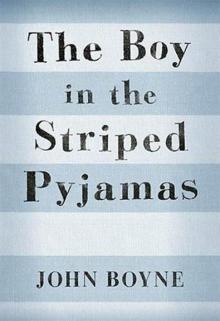 The Boy In The Striped Pyjamas
The Boy In The Striped Pyjamas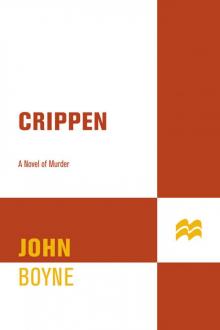 Crippen
Crippen